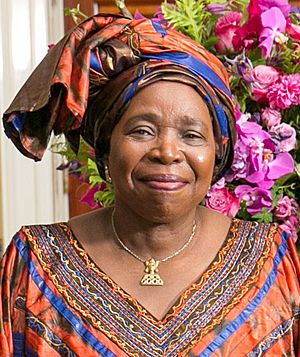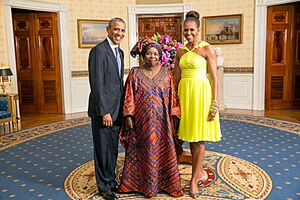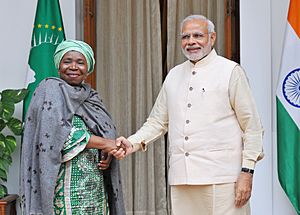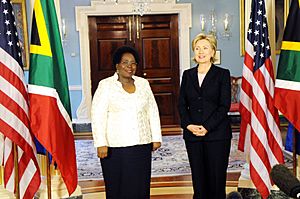Nkosazana Dlamini-Zuma facts for kids
Quick facts for kids
Nkosazana Dlamini-Zuma
|
|||||||||||||||
|---|---|---|---|---|---|---|---|---|---|---|---|---|---|---|---|

Dlamini-Zuma in 2014
|
|||||||||||||||
| Minister of Women, Youth and Persons with Disabilities | |||||||||||||||
| In office 6 March 2023 – 19 June 2024 |
|||||||||||||||
| President | Cyril Ramaphosa | ||||||||||||||
| Deputy | Sisisi Tolashe | ||||||||||||||
| Preceded by | Maite Nkoana-Mashabane | ||||||||||||||
| Succeeded by | Sindisiwe Chikunga | ||||||||||||||
| Minister of Cooperative Governance and Traditional Affairs | |||||||||||||||
| In office 30 May 2019 – 6 March 2023 |
|||||||||||||||
| President | Cyril Ramaphosa | ||||||||||||||
| Deputy | Parks Tau (until 2020) Obed Bapela (2019–2023) Thembi Nkadimeng (2021–2023) |
||||||||||||||
| Preceded by | Zweli Mkhize | ||||||||||||||
| Succeeded by | Thembi Nkadimeng | ||||||||||||||
| Minister in the Presidency | |||||||||||||||
| In office 28 February 2018 – 29 May 2019 |
|||||||||||||||
| President | Cyril Ramaphosa | ||||||||||||||
| Preceded by | Jeff Radebe | ||||||||||||||
| Succeeded by | Jackson Mthembu | ||||||||||||||
| 3rd Chairperson of the African Union Commission | |||||||||||||||
| In office 15 October 2012 – 30 January 2017 |
|||||||||||||||
| Deputy | Erastus Mwencha | ||||||||||||||
| Preceded by | Jean Ping | ||||||||||||||
| Succeeded by | Moussa Faki | ||||||||||||||
| Minister of Home Affairs | |||||||||||||||
| In office 10 May 2009 – 3 October 2012 |
|||||||||||||||
| President | Jacob Zuma | ||||||||||||||
| Preceded by | Nosiviwe Mapisa-Nqakula | ||||||||||||||
| Succeeded by | Naledi Pandor | ||||||||||||||
| Minister of Foreign Affairs | |||||||||||||||
| In office 14 June 1999 – 10 May 2009 |
|||||||||||||||
| President | Thabo Mbeki Kgalema Motlanthe |
||||||||||||||
| Preceded by | Alfred Nzo | ||||||||||||||
| Succeeded by | Maite Nkoana-Mashabane (International Relations and Cooperation) | ||||||||||||||
| 21st Minister of Health | |||||||||||||||
| In office 10 May 1994 – 14 June 1999 |
|||||||||||||||
| President | Nelson Mandela | ||||||||||||||
| Preceded by | Rina Venter | ||||||||||||||
| Succeeded by | Manto Tshabalala-Msimang | ||||||||||||||
|
|||||||||||||||
| Personal details | |||||||||||||||
| Born |
Nkosazana Clarice Dlamini
27 January 1949 Natal, Union of South Africa |
||||||||||||||
| Political party | African National Congress | ||||||||||||||
| Spouse | |||||||||||||||
| Relations | Hlobisile Dlamini (sister) | ||||||||||||||
| Children | 4, including Gugulethu and Thuthukile | ||||||||||||||
| Alma mater | University of Zululand University of Natal University of Bristol University of Liverpool |
||||||||||||||
| Occupation |
|
||||||||||||||
Nkosazana Clarice Dlamini-Zuma (born 27 January 1949), often called NDZ, is a South African politician and medical doctor. She was also an activist against apartheid, which was a system of unfair racial separation.
She has been a member of the African National Congress (ANC) for a long time. The ANC is a major political party in South Africa. Currently, she is the Chancellor of the University of Limpopo.
Dlamini-Zuma grew up in the Natal province. As a student, she joined the Black Consciousness Movement, which fought for the rights of Black people. From 1976 to 1990, she lived outside South Africa, mostly in the United Kingdom and Swaziland. There, she worked as a doctor and continued her activism with the ANC.
Since 1994, Dlamini-Zuma has served in the government under every South African president after apartheid ended. She was the Minister of Health under President Nelson Mandela. She then served as Minister of Foreign Affairs for ten years. Later, she became Minister of Home Affairs, where she helped improve the department's services.
She also served as Minister in the Presidency and Minister of Cooperative Governance and Traditional Affairs. In this role, she helped manage South Africa's response to the COVID-19 pandemic. From 2012 to 2017, she was the Chairperson of the African Union Commission, becoming the first woman to lead this important organization for African countries.
Contents
Early Life and Education
Nkosazana Clarice Dlamini was born on 27 January 1949. She came from a Zulu family in Natal. Her father, Willibrod Gweva, was a teacher, and her mother, Rose, was a homemaker. Her uncle, Stephen Dlamini, was also an activist with the ANC.
Nkosazana was the oldest of eight children. She finished high school in Amanzimtoti at Adams College, a school known for educating many ANC leaders. She graduated in 1967. She wanted to be a lawyer, but her father wanted her to be a doctor. So, she studied zoology and botany at the University of Zululand, graduating in 1971. Then, she went to the University of Natal to study medicine.
While studying medicine, she became very active in the South African Students' Organisation, a group linked to the Black Consciousness Movement. She was elected as its deputy president in 1976.
Life in Exile and Return
Because of her political activities, the police started watching her. So, in 1976, she left South Africa and went into exile. She finished her medical studies in the United Kingdom, getting her medical degree from the University of Bristol in 1978.
While in the UK, she led the ANC Youth Section in Britain from 1977 to 1978. She also worked as a doctor in England for two years. After that, she spent five years in Swaziland, working as a children's doctor at the Mbabane Government Hospital. In Swaziland, she met Jacob Zuma, who was also an ANC activist. They later married.
In 1985, Dlamini-Zuma returned to the UK to study tropical child health at Liverpool University. She continued her work with children's health and helped start a group called the Health Refugee Trust. In 1989, she briefly worked for the ANC Health Department in Zambia.
She returned to South Africa in 1990 when the ANC was allowed to operate again. This marked the start of South Africa's move towards a fair, non-racial democracy. She was part of important talks to end apartheid. She also worked as a research scientist in Durban.
Government Career
Serving as Minister of Health
In 1994, South Africa held its first election where everyone could vote. Nelson Mandela became president, and he appointed Dlamini-Zuma as the Minister of Health. In this role, she worked to make healthcare fair for all races and to control smoking in public places. For example, in 1999, she introduced a law that made it illegal to smoke in public buildings.
During her time as Health Minister, the HIV/AIDS epidemic began in South Africa. She had been an activist for HIV/AIDS awareness before. Her department supported a play called Sarafina II to teach people about HIV/AIDS. However, there were problems with how the project was managed, and it was later stopped.
Leading Foreign Affairs
From 1999 to 2009, Dlamini-Zuma was the Minister of Foreign Affairs under Presidents Thabo Mbeki and Kgalema Motlanthe. She worked to solve conflicts, like mediating in the Second Congo War. She also promoted Mbeki's idea of an "African Renaissance," which aimed to make African countries stronger and more united.
She led important international meetings, such as the 2001 World Conference Against Racism and the 2002 World Summit on Sustainable Development.
Improving Home Affairs
In May 2009, President Jacob Zuma appointed Dlamini-Zuma as Minister of Home Affairs. She held this position until October 2012. She was praised for greatly improving the department, which had faced many challenges.
Under her leadership, the Department of Home Affairs received its first clean audit in 16 years. This showed that the department was managing its money well and providing better services.
Chairperson of the African Union Commission

In January 2012, while still Minister of Home Affairs, Dlamini-Zuma decided to run for the position of Chairperson of the African Union (AU) Commission. The AU is an organization that works to unite African countries.
She was elected Chairperson on 15 July 2012, becoming the first woman to lead the AU Commission. She served until 30 January 2017. During her time, she worked to make the AU more professional and pushed for more women to be in leadership roles within the organization. She also helped create the Agenda 2063 plan, which is a long-term vision for Africa's future.
Return to South African Government

In early 2017, Dlamini-Zuma returned to South Africa. On 21 September 2017, she became a Member of the National Assembly again.
Minister in the Presidency
In February 2018, the new President, Cyril Ramaphosa, appointed Dlamini-Zuma as Minister in the Presidency. In this role, she was in charge of planning and monitoring government projects, and she led the National Planning Commission.
Minister of Cooperative Governance
After the 2019 general elections, President Ramaphosa moved Dlamini-Zuma to lead the Ministry of Cooperative Governance and Traditional Affairs (COGTA). This department works with local governments and traditional leaders.
Role in COVID-19 Pandemic
From March 2020 to April 2022, South Africa was under a national state of disaster due to the COVID-19 pandemic. As the COGTA Minister, Dlamini-Zuma was responsible for making many of the rules for the lockdown. This gave her a very important role in the country's response.
She announced some rules that were not popular, like the ban on selling tobacco during the lockdown. In May 2020, a South African DJ named Max Hurrell made a popular song called "Zol" that used a recording of Dlamini-Zuma explaining why sharing roll-up cigarettes could spread the virus. The song became very popular online, and Dlamini-Zuma even congratulated the DJ for entertaining the nation.
Minister of Women, Youth and Persons with Disabilities
In a government change on 6 March 2023, President Ramaphosa appointed Dlamini-Zuma as the Minister responsible for Women, Youth and Persons with Disabilities. She served in this role until June 2024.
African National Congress Leadership

Dlamini-Zuma first joined the National Executive Committee (NEC) of the ANC in the early 1990s. The NEC is a main leadership group within the party. She has been re-elected to the NEC many times.
Campaigns for Leadership
In 2007, she ran for the position of Deputy President of the ANC but did not win. However, she received the most votes of any candidate for the NEC in 2012.
In 2017, Dlamini-Zuma ran for the ANC presidency. She was supported by the ANC Women's League and Youth League. Her campaign focused on making big changes to the economy, like redistributing land. She narrowly lost the election to Cyril Ramaphosa.
In 2022, she was nominated to run for the ANC presidency again, but she did not win.
Personal Life
Dlamini-Zuma was married to former President Jacob Zuma from 1982 to 1998. They have four daughters together: Msholozi, Gugulethu Zuma-Ncube, Nokuthula Nomaqhawe, and Thuthukile Zuma. They divorced in 1998.
Her younger sister, Hlobisile Dlamini, is also a member of the ANC and serves in the KwaZulu-Natal Legislature.
Honours and Recognition
Dlamini-Zuma has received several honours for her work. In 2013, she received the Order of Luthuli in gold, a high award in South Africa. The same year, she was named one of New African magazine's top 100 most influential Africans. In 2015, she was featured as one of the BBC's 100 Women.
In 2019, she became the Chancellor of the University of Limpopo, which is an honorary position. In 2016, a new municipality in KwaZulu-Natal was named the Dr Nkosazana Dlamini-Zuma Local Municipality in her honour.
See also
 In Spanish: Nkosazana Dlamini-Zuma para niños
In Spanish: Nkosazana Dlamini-Zuma para niños
 | Leon Lynch |
 | Milton P. Webster |
 | Ferdinand Smith |

